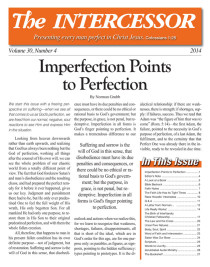
The Faith Life Has it’s Tight Times
One of my favorite Scriptures which I have used among us dozens of times, was when Paul warned the Corinthian church about the danger of thinking themselves to be well off because they were full and rich, "and reigned as kings without us"; but God’s standard for apostleship (and I reckon the called of God are the apostles) is "appointed to death
spectacles to the world
fools
weak
despised; hungry, thirsty, naked, buffeted, with no certain dwelling place: labouring with our own hands, reviled, persecuted, defamed, and as the filth of the world and offscouring of all things" (1 Cor. 4:9-13). That has always kept us from thinking that we approached within a hundred miles of apostolic and Scriptural standards of the missionary calling; and that if we have appeared a little more extreme than some, we are miles from the extremes of our forerunners. So personal financial shortage is a very little thing. Paul’s standard again suits us: "having food and raiment, let us therewith be content."
We are not saying that God calls others to go this way, and we are thankful, as Paul was, for those who have this world’s goods and the comforts of life, and who so freely use them for God. Paul did not tell the rich to give away their riches; but, while warning them of special dangers and snares in wealth, told them to "do good, be rich in good works, ready to distribute, willing to communicate." And where would all of us be who have this special calling of serving Christ, if there were not the Gaius’s whom John thanks for his well-known "charity to the brethren and to strangers"? So I thank God for those who have this world’s goods, and whose ministry in the Gospel is at least partly by the distribution of them.
We had our tight times specially in our earlier days, when we were just starting to live as a household by faith. We were then about ten in the house. We also had with us C.T.’s mother’s old personal maid, from the days when the Studd family lived in Hyde Park Gardens off Park Lane (these are the years described by Edith, C.T.’s daughter, in her new book). Now retired, the old lady had her home with us, though out of kindness she insisted on cooking for the household. Miss Musset by name, called "Muss" by all of us, she professed to laugh at our weird ideas of living on the promises of God, though she liked the young candidates, especially the boys, whom she called "the Hallelujah Boys." She lived in the basement where we had our dining-room and kitchen, but would not eat with us. The time came when there was not a thing in the house: no money, not even bread or milk or butter, or the inevitable Englishman’s tea. So we decided that at mealtimes, instead of going down to the dining-room, we would meet in the living-room, and have our meals by feeding on the Lord! But it never once happened, all through a week of having nothing.
Every day, three times a day, the bell rang just when we would be getting ready to meet upstairs, and down in the dining-room we would find bread, cheese, tea, milk and sugar. We never knew where they came from, and could only surmise from our cynical friend, Muss! On the eighth day there was a ring at the door-bell as we were eating; a man was outside and inquired if this was the Grubbs’ house. He had a load of a ton of potatoes from a farmer who had recently heard of us and sent these along. It was certainly Hallelujah boys who carried those sacks in! Other provision came soon also and things returned to normal. But we always said anyhow God had given us extra, because the prayer is for daily bread, but we had cheese on top.
That same farmer, Warren Andrew, became a dear personal friend; he and his brother Will (both now with the Lord) and their sisters, especially Eleanor, have been a family whose love and friendship and constant visits to their home have been outstanding in our lives. Warren sent us sacks of lentils through those early years. Often they were our main diet, and sometimes we used to laugh and compare ourselves to the Israelites when it said the quails were so abundant they came out of their nostrils!
Once I was leaving home for a few days of meetings. We were just our own family of five at that time, and maybe one or two others. Before I left I asked Pauline what food or money she had. She said no food and 4s. (50c.) in cash. So we prayed and I left her, like any good husband, humanly to starvation, while I went to plenty! I hadn’t left the house more than an hour or two, when a van drove up from a very highbrow West End store, Barkers. It contained a large hamper, not of luxury foods but of the basics: a joint of meat, packets of cheese, butter and so forth, and at the bottom a box of chocolates for "The Grublets." We had no idea where it came from.
After my return, we visited by invitation two friends in an apartment in Kensington, not far from Barkers. Our hosts were the two I have just mentioned, Will and Eleanor Andrew, brother and sister. At that time, we had only met them twice before. While we were there, Will took Pauline aside and asked her if she received a hamper of food on a certain day. Then he explained that as he was having his quiet time that morning, a voice had distinctly said to him, "Go to Barkers and order ample provision for a number of ordinary meals, and send it to the Grubbs."





